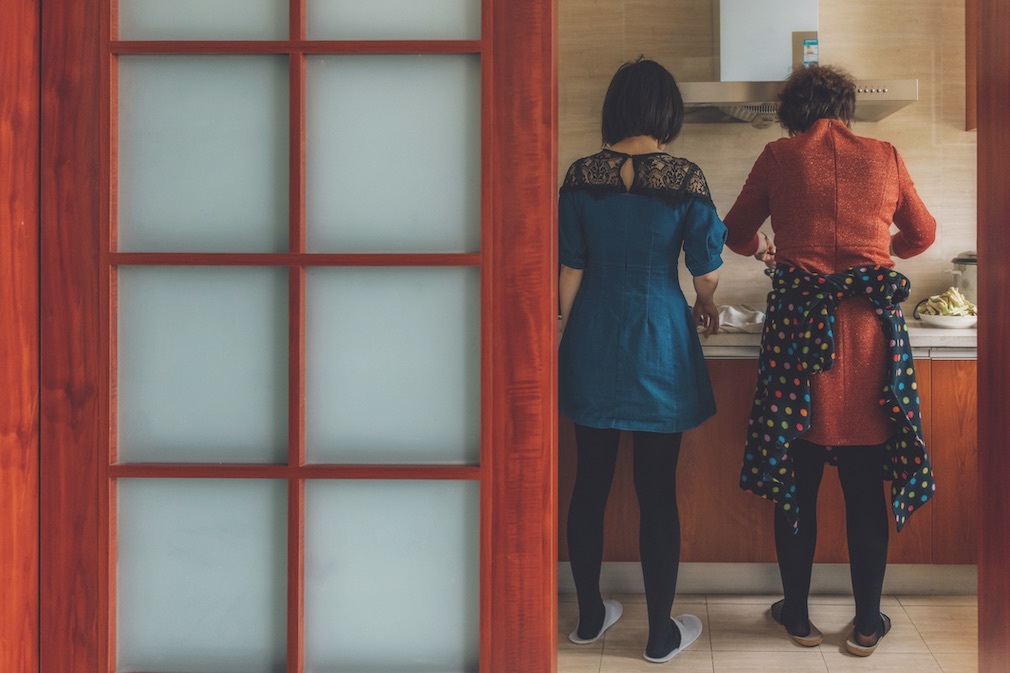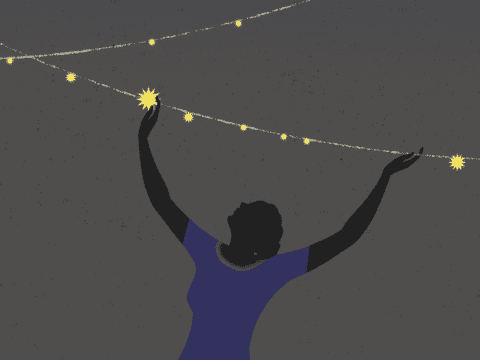“Angel — no nose, no eyes?” Popo asks with a smile. My grandmother, the matriarch of the family, examines a handmade faceless angel ornament, squeezing and touching the halo with her crooked fingers. She lifts it by its metal hook, giving it to me to put on the tree.
Her face lights up with surprise as she unpacks each ornament from the box by her feet, not remembering they are the same ornaments we have hung on the tree for years. After we finish decorating, I see Popo staring past the tree in contemplation. “Popo, what are you thinking about?” I ask.
You may unsubscribe from any of our newsletters at any time.
“You know, Christmas is happy and sad,” she says. “Happy because you’re with family, everyone’s around. Sad because you remember what you lost.” She doesn’t have to say his name. I know she’s still grieving Gung Gung, my grandfather who died 30 years ago.
And now, several years after we decorated that tree, I’m grieving the gradual loss of her. It has been difficult to watch as Popo’s health has declined with broken hips and dementia. As I see her fade, I can already feel the immense hole that will be her absence.
More on Broadview:
- ‘To Mom, Love Santa’: How I gave my mother the North’s magic
- A Blue Christmas service gave me fresh perspective on my parents
- A different Christmas still offers a chance for growth
I have no memory of my grandfather because he passed away when I was three years old. Popo has told me many stories about him, including his expertise in the kitchen and his love for family. After Gung Gung’s death, Popo continued his legacy of bringing our Chinese-Jamaican family together through food, and Christmas was no exception.
Turkey. Ham with pineapple. Sweet and sour duck. Dungu chicken. Steamed tofu. Pork with black fungus. Vegetables with shrimp, and more. She would be up at 5 a.m. on Christmas Day, timing everything perfectly. I don’t know how she managed to pull it off every year, but she did. Everyone was welcome at Popo’s table.
On Christmas Eve after the church service, loud patois filled the kitchen as we dug into egg rolls, garlic crab and hardo bread. When my cousin and I wrapped egg rolls with her, Popo was adamant on presentation, snapping off the ends of each bean sprout so they “looked good.”
After filling our bellies, we would excitedly wait to open presents. Everyone would take turns sitting beside Popo as she opened their gifts. She was the one whose joyful reaction we craved. She received each present with the brightest smile and thank you, as if you had given her the best gift.
One of my favourite holiday traditions was making Jamaican rum cake with her. I remember standing on a chair as a young child, staring into the big stainless steel bowl and dipping my fingers into the butter and sugar. She would let my brothers and me help measure and add flour, eggs, molasses, vanilla and other ingredients before adding the true star of the cake — fruit that had been soaking in rum for a year.

When I asked to mix everything together, she told me I couldn’t stir it too much or the cakes would get tough. I watched her strong hands slowly fold the last bits of flour and fruit into the mix. Rum cake after rum cake with a cherry in the middle would come out of the oven to give to family and friends.
I can’t remember the last Christmas she cooked for us. But the way she still kneads dough and pinches the top of dai bao (steamed buns) is an art. The muscle memory in her hands remains, even with no recollection of the recipe.
Popo spent her whole life taking care of the family. How strangely the roles have shifted 30 years later. These days, I feed her, brush her hair and tuck her into bed, just like she did for me when I was little.
I try to imagine a Christmas without her, and it doesn’t seem possible. My heart aches at the thought, knowing the immense loss coming for me and my family. But I have lost her many times already — with each little death that comes with dementia. She isn’t the same Popo who baked rum cake with me or filled the table with extravagant Christmas dinners.
Everyone was welcome at Popo’s table.
Several Christmases ago, Popo told me she was ready to see Gung Gung and how she still cries for him every day. “But Popo, I’m going to miss you and cry for you every day,” I told her.
“I’ll always be with you, Jenna,” she replied.
I hold on to those words just as I hold on to all the Christmases we have spent together and each precious moment I have with her now — whether or not she knows who I am. She may not make it to Christmas this year, but we will always be connected, our lives kneaded and folded together by her beautiful hands.
***
This article first appeared in Broadview’s December 2020 issue with the title “Popo’s table.”
Jenna Tenn-Yuk is a writer and speaker in Toronto.
We hope you found this Broadview article engaging.
Our team is working hard to bring you more independent, award-winning journalism. But Broadview is a nonprofit and these are tough times for magazines. Please consider supporting our work. There are a number of ways to do so:
- Subscribe to our magazine and you’ll receive intelligent, timely stories and perspectives delivered to your home 10 times a year.
- Donate to our Friends Fund.
- Give the gift of Broadview to someone special in your life and make a difference!
Thank you for being such wonderful readers.
Jocelyn Bell
Editor/Publisher















